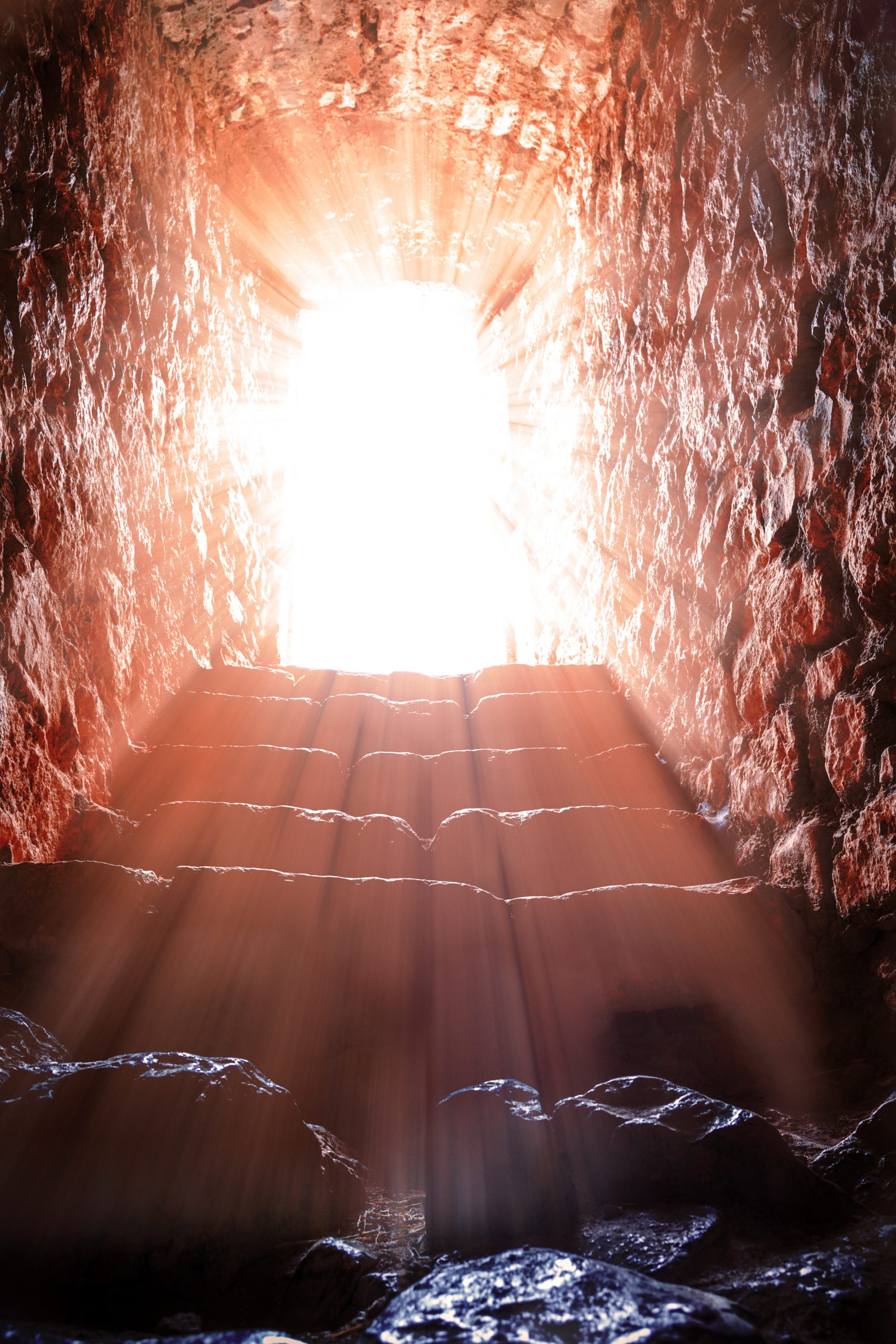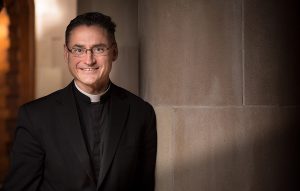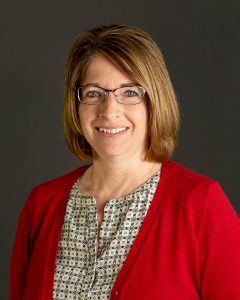
By Laurie Stiegelmeier
Abandonment, betrayal, hatred, denial, pain and death—most of the disciples believed it was the end. But we know that light and life burst out of the tomb three days later. Jesus overcame death, and all that seemed hopeless was given greater life when he sent the Holy Spirit to give birth to his bride, the Church.
Father Andrew Dickinson, pastor of Sacred Heart and St. Mary in Aberdeen, temporary pastor of Sacred Heart in Westport and priest director of St. Thomas Aquinas Newman Center at Northern State University, said we need to remember there is no Easter without Good Friday. “Neither feast makes sense without the other. ‘Easter people’ live knowing that Christ has conquered death,” he said.

A suffering Church
While we believe in the Resurrection and ultimate triumph of God’s people, the Church continues to suffer. Blessed Anne Catherine Emmerich’s visions showed her that Jesus’ greatest agony, the one that caused him to sweat blood, was from seeing all his bride would endure. Our sins of unworthy reception of the Eucharist, indifference to Mass, ingratitude, sacrilege and abandonment—along with heresies, persecutions and divisions—were portrayed as tearing her apart.
In Ephesians 5:25-27, we read: “… Christ loved the church and handed himself over for her to sanctify her, cleansing her by the bath of water with the word, that he might present to himself the church in splendor, without spot or wrinkle or any such thing, that she might be holy and without blemish.” Jesus’ love explains his great agony; the everlasting covenant is reason for our hope.
Just as Jesus overcame the attacks of Satan and man to fulfill God’s plan of redemption, so will the Church when she is perfected in the glory of heaven when he returns. Until then, according to paragraph 769 of the Catechism of the Catholic Church, she knows that this will not happen without great trials. She must walk the same paths that Jesus walked.
“This is very contrary to our modern notion of the ‘progress’ of history, that things will always get better. We must convert from the thinking of our day to the thinking of the Church in this regard,” Father Dickinson said.
In a 1969 German radio interview, Father Joseph Ratzinger, who later became Pope Benedict XVI, was asked what the Church would look like in the year 2000. He said, “The future of the Church can and will issue from those whose roots are deep and who live from the pure fullness of their faith,” and “from the crises of the day the Church of tomorrow will emerge.
“She will become small and will have to start afresh more or less from the beginning,” he continued. “… But in all of the changes at which one might guess, the Church will find her essence afresh and with full conviction in that which was always at her center: faith in the triune God, in Jesus Christ, the Son of God made man, in the presence of the Spirit until the end of the world. In faith and prayer she will again recognize the sacraments as the worship of God and not as a subject for liturgical scholarship. … When the trial of this sifting is past, a great power will flow from a more spiritualized and simplified Church. Men in a totally planned world will find themselves unspeakably lonely. If they have completely lost sight of God, they will feel the whole horror of their poverty. Then they will discover the little flock of believers as something wholly new. They will discover it as a hope that is meant for them, an answer for which they have always been searching in secret.”
Today, the prevailing culture is anti-Christian, and Christians are becoming less-so without a complete awareness of their slide into secularism. Christendom has ended. We are living in what Pope Benedict described as a time of “becoming small” and “starting afresh”; we are living in an apostolic age.
“There are many cultural elements that oppose the Church; we cannot deny this and embrace naive optimism,” Father Dickinson said. He names politicization (viewing things in terms of “camps” and “power”) and moral relativism (which robs us of charity) as causing us to neglect the spiritual works of mercy of correcting sinners, encouraging the doubtful, and instructing the ignorant.
“I think the trials we face in the West are especially difficult,” Father Dickinson said. “What does it mean to be a follower of Christ in our pluralistic society? How do we proclaim Christ to a world that has embraced moral relativism? How do we love our neighbor when we’re told, ‘What business of yours is it what your neighbor does?’”
Related to this and no less dire, he said, is the crisis of Church authority due to failures in the priestly sexual abuse crisis. “We have lost our ability to speak with moral authority to our broader culture. This means that we can’t just simply fly the flag and bring people in; rather, our evangelical work must be more individual and the result of authentic personal witness by our average parishioners.”
“We can’t go along with our secular culture and remain Christian,” Renae Kranz, director of communications for the diocese, said. “We need to find ways, with fewer resources, to employ lifelong Catholic missionary discipleship. As Catholics, it’s not enough to just go to Mass on Sunday and forget we’re Catholics the rest of the week. We must build our own faith to get ourselves into a place where we can then help build the Church again.”
The challenge we face
Father James Mason, pastor of Holy Spirit Parish in Sioux Falls, said the Church has had to learn how to be unpopular in this apostolic age. But he believes the biggest trial today is against the theological virtue of hope.

“Satan wants to tempt us to despair but simple prayers throughout each day like ‘Jesus I trust in you’ will help us be people who believe that the final victory has been won,” Father Mason said. “In the face of opposition, there is the temptation to spiral down and close off. Our faith must be anchored on something deep; we need to be anchored in the Living Word and the Eucharist. We’ve never been promised it would be easy, but Christ has won the victory. Christ will win out. Lent prepares us for that.
“As a pastor, Lent is my favorite season because people are willing to go deeper in their spiritual life and challenge themselves to follow Jesus more closely,” he continued, explaining that Lent is a season when we recognize that fasting, almsgiving and penance don’t take anything away from us but help us recognize we’re made for more than what we deny ourselves.
Like Lent, the challenge our diocese is facing through restructuring won’t be easy, but with God’s grace, perhaps we will learn we are made for mission.
Restructuring, called Set Ablaze in our diocese, is happening in many dioceses all over the country. The need to see parish connections in a new way is caused by demographic shifts, lower numbers of Catholics who practice their faith, and the decline in new vocations to the priesthood.
“Change will always be hard. It certainly will be messy,” Father Mason said of Set Ablaze. “It will take understanding and openness to succeed. There is still hope, and a challenge to us. Underneath is a call to evangelize, to ask ourselves ‘How can I bring non-practicing Catholics back? How can I invite non-Catholics into the Church?’”
“We all have to step up and step into evangelization,” Renae said. “The decline of the Church is always a negative, but it’s also an opportunity for us. Remember that the Apostles started with far less and started a Church that has spread worldwide and lasted for centuries.”
“We need to soberly name our trials without fear of being overcome by them in naming them,” Father Dickinson said. “It is only in embracing them that we meet the cross, and it is only in meeting the cross that we ‘passover’ to Easter. Set Ablaze will give pastors and priests an opportunity to name the trials with our parishioners and help us all turn our faces toward them so we might embrace these crosses both individually and corporately.”
Father Dickinson says that addressing these trials will mean some suffering—and even some “death”—but if we take up our cross to follow Christ, we will follow him to his resurrection. His hope is that Set Ablaze will allow us to overcome a “maintenance” mind-set and be converted to a “mission” mindset that allows us to grow the faith.
Full of hope
Sharing her hope for the diocese and the universal church, Renae said that even if it feels like it is shrinking, we can build it back up with God’s help. “We absolutely can turn it around. This isn’t the first time it’s happened in the Church’s history, and the Holy Spirit isn’t going to leave us alone,” she said.
“My biggest expectation is for parishioners to understand that they are the Church,” Father Dickinson said. “The Church is not reduced to a building or a Mass but is found in the life of every baptized Christian. We must all awaken to our own share in Christian mission as the lay apostolate—what Bishop DeGrood consistently describes as Lifelong Catholic Missionary Discipleship Through God’s Love. I am convinced that God is prompting each one of us with his grace for the renewal and spread of the Gospel. The more we learn to respond to God’s grace, the more we will be Set Ablaze.”
Father Mason said that faithful Catholics can reinvigorate the Church by growing in their own faith, calling on the Holy Spirit to direct their lives and show them how to share the joy they’ve discovered. They need to be able to explain the faith and to allow the Eucharist to shine through them.
Renae said unknowns can be unsettling, and many aspects of the restructuring remain to be decided during pastoral planning within the pastorates. In each pastorate, one priest will be pastor, while other priests will be involved in ministry and other types of service. Nearly every pastorate will have two priests, but she said that not every assignable priest is on the map, so there are more priests who will be assigned (see pages 4 and 5), and retired priests who currently assist can continue if they wish. When assignments are complete, the priests and available deacons in each pastorate will begin working on pastoral planning.
Despite our current emotions about the coming changes in our diocese, the laity must be the hope by rising to the challenge. We must imitate the early Christians who not only kept the faith of the Apostles alive, but also made it spread like wildfire. This is what will bring about the renewal that then-Father Ratzinger spoke of when people will find the hope that was destined for them, the answer to their secret search, in the faithful remnant of believers.
While we labor as missionary disciples, there are signs of resurrection in the Church. Father Mason said that eucharistic adoration had fallen out of practice for a time, but many churches are reinstituting it. He sees the Eucharistic Revival; Bishop Barron’s Word on Fire Ministry; The Augustine Institute; young adult movements such as FOCUS, St. Paul’s Outreach and NET (National Evangelization Teams); and Catholic Newman Centers and colleges and Catholic study programs as signs of renewal.

Renae sees God’s hand in how all the seemingly disparate initiatives in our diocese are working together. “We have a new bishop who received in prayer the vision of lifelong Catholic missionary discipleship. Then we have the Eucharistic Revival to renew the Church in our country; then Set Ablaze, which is fed and sustained by the Eucharistic Revival, and whose goal is to build missionary disciples. It’s all God’s work, his timing, how all these things have come together.”
Signs of renewal
There are signs of renewal in our culture as well. A Jan. 3, 2023, news release on prnewswire.com stated that “The Bible in a Year” podcast was the no. 1 show on Apple podcasts in both 2021 and 2022. It was described as “wildly successful.” This year, it is no. 3 in all categories, and “The Catechism in a Year” is in the no. 1 position. The news release continues: “As Christian affiliation declines across American society, it is notable that the top podcast on Apple at the beginning of 2023 is focused on guiding listeners through a traditional Catholic text.”
Jonathan Strate, podcast producer and Ascension Press’ president and CEO, says in that same news release that it is an astonishing moment for the Catholic Church. “It speaks to the deep longing we all have to respond to God’s plan for each one of us—a plan revealed so beautifully in the treasure that is the Catechism,” he said.
“We can have lots of hope,” Renae said. “We come out of the bleakness of Lent and burst into the light of Easter. We can come out of our secular culture into the light. That’s what we want to do. And bring as many people with us as we can!”
“We can bring Easter into the Church by not fearing the suffering and trials that are before us,” Father Dickinson said. “If we embrace them with faith in Jesus, who brings life out of death, we can be a vessel of Easter in the Church.”
Remember Jesus’ words in Matthew 16:18: “And so I say to you, you are Peter, and upon this rock I will build my church, and the gates of the netherworld shall not prevail against it.” As God, Jesus cannot deceive nor be deceived; we can trust in him and stand, an unshaken “Easter people” on the Rock—the Church and bride of Christ.


